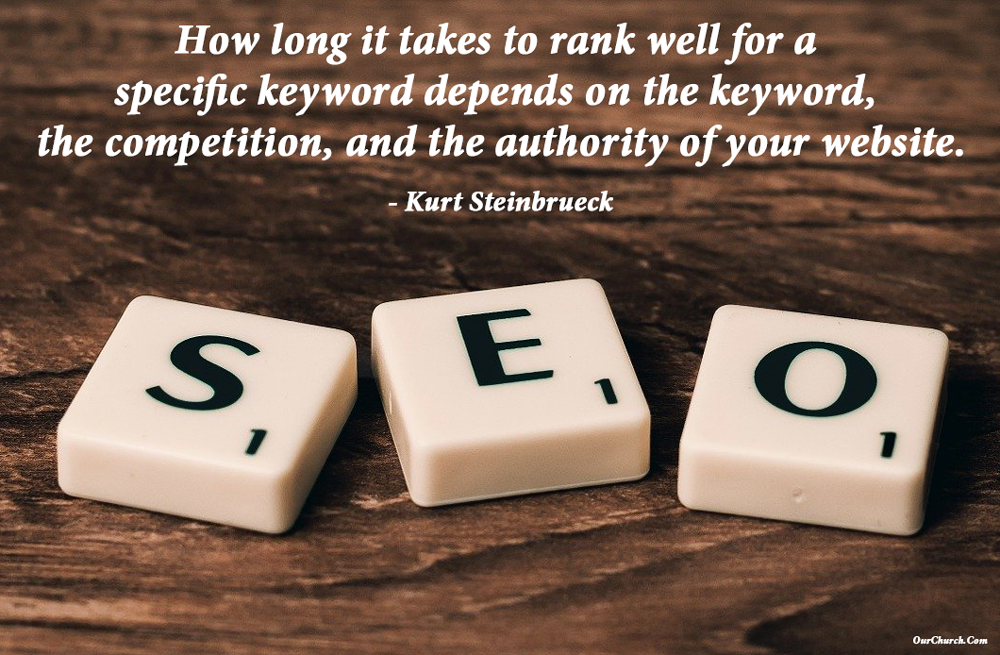We all want great search rankings, and we want them now!
SEO (search engine optimization), however, is a process that takes time. But how much time?
In this Search Engine Optimization Frequently Asked Questions (SEO FAQs) video blog, I address the question, How long will it take to rank for my keywords? and discuss the 2 main factors that impact SEO timetables.
(The article below is a summary of the video, but you’ll get more details and examples if you watch the video.)
How long will it take to rank for my keywords?
Whether you’re doing SEO yourself or have hired a company to help, it’s good to have the right expectations so you can plan accordingly.
There’s no specific timeframe that it will take your website to rank well for a particular keyword. However, there are several factors that determine the time it takes to rank well for a keyword.
Standard SEO Tasks
Technical SEO: If your website has issues with being crawled or has slow loading times, these need to be fixed to ensure search engines can read and index your content. The more technical problems you have, the longer this will take. For more on this, see What is Technical SEO?
Keyword research: Selecting the right keywords is crucial for SEO success. You want to pick keywords that are both relevant and popular and for which you have a reasonable shot at ranking well. This typically takes about a week to nail down. For more on this, see What is Keyword Research?
On-page Optimization is another standard part of any SEO project. It involves tweaking the content on your website to make it more relevant to your target keywords. Usually, this takes around a week as well. For more on this, see What is On-Page Optimization?
Local SEO Tasks
If your organization focuses on a specific local area, like a church, school or local business, there are an local SEO tasks that need to be done. These include setting up, verifying and optimizing a Google Business Profile, and listings on other local directories and map websites. This could take anywhere from a month to two months, depending on the complexity. For more on this, see What is Local SEO?
Your Authority vs Your Competition
The biggest variable in how long it takes to rank well is the authority of your website compared to your competition. For instance, if you’re the only church in a small town, you’re going to be the most authoritative site for “church in [your town]” after optimizing your on-page content and doing local SEO. You’ll rank well quickly because of little competition.
However, if you’re a Christian school in a big city with numerous competitors, building your authority will take time. You’ll need to engage in activities like link building, writing blog articles, and getting guest blog articles on other websites that link back to yours. The more authority you need to gain, the longer it will take to surpass your competitors in search rankings. For more on this, see What is link building (backlinks) in SEO?
Investment Size = Acceleration
Finally, your investment in SEO has a big impact on the time it takes to improve search rankings. The bigger the investment, the more link building, blog articles, and guest blog posts that can be done each month. This accelerates your progress and authority-building.
I hope this gives you a good idea of what factors impact how long it takes to get good search rankings.
How long it takes to rank well for a specific keyword depends on the keyword, the competition, and the authority of your website. -Kurt Steinbrueck

Progressive SEO is one of the strategies we use with our SEO clients. (No, it has nothing to do with politics.) When we do keyword research for a client, we look for less competitive keywords the client can rank well for immediately as well as more competitive keywords the client will be able to rank well for as their authority progresses.
This way they client will experience some gains in search rankings and website traffic quickly, and increasingly bigger gains in rankings and traffic as the SEO progresses.
If you’d like to discuss church SEO or Christian SEO for your business, school or ministry, with one of our SEO experts, fill out the consultation request form below.
Comment and Discuss…
- What questions do you have about the time SEO takes?



6 Comments
Just listened to a portion of your video. From what I can hear, it seems you have some good insights. Right now, I am seeking to improve my site's traffic. Inspiration Point contains encouraging stories that I've written. It's not a commerce or theology type site.
I've had this site for a couple of years and I struggle with site traffic. I found your article via LinkedIN's group and I was hoping to get some better insights. I'd love to get some input.
As for the video, please do something with the audio. I could barely hear what's said. That's not good.
Hi Barry, thanks for the comment and the feedback concerning the audio.
Without a link, it's tough to provide you with any insight concerning your site. 🙂 If you'd like to talk more about it, your best option would be to talk things over in a free consultation. Just complete the form on https://marketing.ourchurch.com to get the ball rolling.
Hi Paul,
Thank for replying. I didn't think to put my site address; as I thought my name would show it. I'll give the link a shot. FYI, my site's name is Inspiration Point and the site address is http://www.inspiration-point.org.
Hi Barry,
I reviewed your site and thought I'd share some observations. To start, you have some very good stories and I thank you for sharing them.
If you haven't already done so, a good starting point would be to take a few minutes to consider and write down exactly what you hope to accomplish with you site. Create a mission and perhaps even set some goals. Inspirational stories can cover a wide variety of subjects. So, you may want to consider being more specific in your mission. This can help focus your marketing efforts and your writing.
From an SEO standpoint, there are several areas of opportunity. If you haven't done so already, I'd recommend you start with some keyword research in relation to your general topic, inspirational stories (and variations), to see when you may want to specifically target with your primary pages (homepage, about, etc). Then optimize those pages.
While it's good to optimize for your primary topic, this type of blog site (inspirational stories) typically get most of their search traffic from longtail keywords. Because the subject matter of the stories tends to vary a bit, it's hard to rank well for core keywords for each of those subjects, instead as your site establishes itself, you will most likely get traffic from longtail keywords related to the variety of topics you write about.
Some other strategies that I think would be helpful for you would be to seek other bloggers in your niche and to work on creating a strong social presence. Inspirational story type blogs tend to grow best when other people share your posts or recommend the site. By connecting with other bloggers, you not only gain the relational benefits, but you can refer to each other's posts and even exchange content occasionally (you post on their blog and they post on your blog). This can help both blogs to grew by putting you in front of the other's audience. Connecting with other bloggers also generates natural links which will benefit your SEO.
Connecting with and interacting with people in the social networks can also grow your blog. A lot of people who read inspirational stories read them because someone recommended the story to them and that happens a lot on the social networks. So, creating a strong presence in the social networks is another great way to get new readers and generate traffic.
I wish you the best with your blog. God bless!
How many keywords is the best practice to rank for per page? I’ve heard very mixed advice about this and I’m never sure if you can “over-do” it for a certain page and it’s better to focus on just 1 or 2. My site is https://www.commercialdiversmiami.com
Hi Lana, we recommend targeting 2 keywords per page, though there can be exceptions.